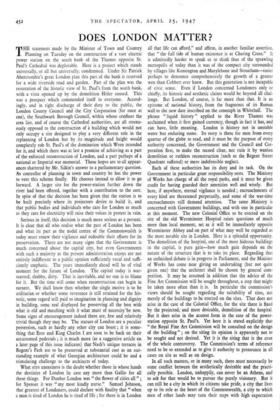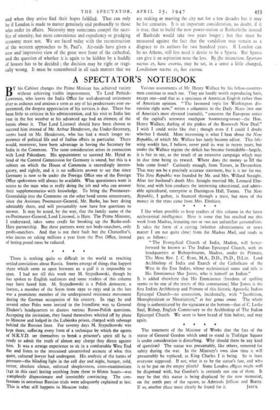DOES LONDON MATTER ?
THE statement made by the Minister of Town and Country 1 Planning on Tuesday on the construction of a vast electric power station on the south bank of the Thames opposite St. Paul's Cathedral was deplorable. Here is a project which stands universally, or all but universally, condemned. Under Sir Patrick Abercrombie's great London plan this part of the bank is reserved for a wide riverside road and garden. Part of the plan was the restoration of the historic view of St. Paul's from the south bank, with a vista opened up by the demolition Hitler caused. This was a prospect which commended itself to everyone. Accord- ingly, and in right discharge of their duty to the public, the London County Council and the City Corporation (for once at one), the Southwark Borough Council, within whose confines the area lies, and of course the Cathedral authorities, are all strenu- ously opposed to the construction of 1 building which would not only occupy a site designed to play a very different role in the replanning of London but by its magnitude and height would completely rob St. Paul's of the domination which Wren intended for it, and which there was at last a promise of achieving as a part of the enforced reconstruction of London, and a part perhaps of a national or Imperial war memorial. Those hopes are to all appear- ances shattered by Mr. Silkin's answer to a parliamentary question. As controller of planning in town and country he has the power to veto this scheme finally. He chooses instead to allow it to go forward. A larger site for the power-station further down the river had been offered, together with a contribution to the cost. In spite of that the decision has been given that the station is to be built precisely where its projectors desire to build it, and that public bodies and individuals who care for London as much as they care for electricity will raise their voices in protest in vain.
Serious in itself, this decision is much more serious as a portent. It is clear that all who realise what the past of London has been and what its part as the nodal centre of the Commonwealth is today must renew their vigilance and redouble their efforts for its preservation. There are not many signs that the Go-‘7emment is much concerned about the capital city, but even Governments with such a majority as the present administration enjoys are not entirely indifferent to a public opinion sufficiently vocal and suffi- ciently emphatic. The years immediately ahead will be of vital moment for the future of London. The capital today is war- scarred, shabby, dirty. That is inevitable, and no one is to blame for it. But the time will come when reconstruction can begin in earnest. We shall know then whether the single motive is to be utilitarian or whether some reverence is still retained for the his- toric, some regard still paid to imagination in planning and dignity in building, some zeal displayed for preserving all the best with what is old and matching with it what must of necessitfbe new. Some signs of encouragement indeed there are, few and relatively trivial though they may be. The statues of London are a peculiar possession, such as hardly any other city can boast ; it is some- thing that Eros and King Charles I are soon to be back on their accustomed pedestals ; it is much more (as a suggestive article on a later page of this issue indicates) that Nash's unique terraces in Regent's Park are to be preserved at substantial cost as an out- standing example of what Georgian architecture could be and a stimulating challenge to the architects of today.
What stirs uneasiness is the doubt whether those in whose hands the destinies of London lie care any more than Gallio for all these things. For Dunbar London was " the flower of cities all ; for Spenser it was " my most kindly nurse." Samuel Johnson, that greatest of Londoners, could declare with finality that " when a man is tired of London he is tired of life ; for there is in London all that life can afford," and affirm, in another familiar assertion, that " the full tide of human existence is at Charing Cross." It is admittedly harder to speak or to think thus of the sprawling metropolis of today than it was of the compact city surrounded by villages like Kensington and Marylebone and Streatham—easier perhaps to denounce comprehensively the growth of a greater wen than Cobbett ever knew. But this generation is not incapable of civic sense. Even if London concerned Londoners only or chiefly, its historic and aesthetic claims would be beyond all chal- lenge. But London, of course, is far more than that. It is an epitome of national history, from the fragments of its Roman wall to the new date inscribed on the cenotaph in Whitehall. The phrase " liquid history " applied to the River Thames was acclaimed when it first gained currency, though in fact it has, and can have, little meaning London is history not in unstable water but enduring stone. Its story is there for men from every quarter of the globe to read, and it must be the purpose of every authority concerned, the Government and the Council and Cor- poration first, to make the record clear, not ruin it by wanton demolition or ruthless reconstruction (such as the Regent Street Quadrant suffered) or mere indefensible neglect.
Each of these authorities has its duty and its task. On the Government in particular great responsibility rests. The Ministry of Works has charge of all the royal parks, and it must be given credit for having guarded their amenities well and wisely. But here, if anywhere, eternal vigilance is needed ; encroachments of every kind are threatened perpetually, and some of the war-time encroachments still demand attention. The same, Ministry is concerned with Government buildings, and with one in particular at this moment. The new Colonial Office to be erected on the site of the old Westminster Hospital raises questions of much more than local moment, set as it will be immediately opposite Westminster Abbey and on part of what may well be regarded as the most notable site in London. Here is a splendid opportunity. The demolition of the hospital, one of the most hideous buildings in the capital, is pure gain—how much gain depends on the nature of the structure that is to take its place. Regarding that an unfinished debate -is in progress in Parliament, and the Minister of Works has come near giving an undertaking (but not quite given one) that the architect shall be chosen by general com- petition. It may be assumed in addition that the advice of the Fine Art Commission will be sought throughout, a step that might be taken more often than it is. In particular the commission's views should be sought regarding the suitability of sites, not merely of the buildings to be erected on the sites. That does not arise in the case of the Colonial Office, for the site there is fixed by the projected; and most desirable, demolition of the hospital. But it does arise in the acutest form in the case of the power- station opposite St. Paul's. Yet here it is stated explicitly that "the Royal Fine Art Commission will be consulted on the design of the building " ; on the siting its opinion is apparently not to be sought and not desired. Yet it is the siting that is the crux of the whole controversy. The Commission's terms of reference need to be so extended as to give it authority to pronounce in all cases on site as well as on design.
In all such matters, or in many such, there must necessarily be some conflict between the aesthetically desirable and the practi- cally possible. London, unhappily, can never be an Atheni, and to ask for that would be to pursue the purely visionary. But it can still be a city in which its citizens take pride, a city that lives up to its role as the heart of the Commonwealth, a city to which men of other lands may turn their steps with high expectation
and when they arrive find their hopes fulfilled. That can only be if London is made to matter genuinely and profoundly to those who order its affairs. Necessity may sometimes compel the sacri- fice of amenity, but mere convenience and expediency or grudging economy must not. We are faced today with the reconstruction of the western approaches to St. Paul's. Air-raids have given a new and'impressive view of the great west front-of the cathedral, and the question of whether it is again to be hidden by a huddle of houses has to be decided ; the decision may be right or tragi- cally wrong. It must be remembered in all such matters that we are making or marring the city not for a few decades but it may be for centuries. It is an important consideration, no doubt, if it is true, that to build the new power-station at Rotherhithe instead of Bankside would take two years longer ; but that must be measured against the fact that the vandalism may remain as a disgrace to its authors for two hundred years. If London can be no Athens, still less need it desire to be a Sparta. 'But Sparta can give it an aspiration none the less. By„Lhe injunction, Spartans nactus es, hanc exorna, may be set, in a sense a little changed, Londinium nactus es, hoc exorna.



































 Previous page
Previous page